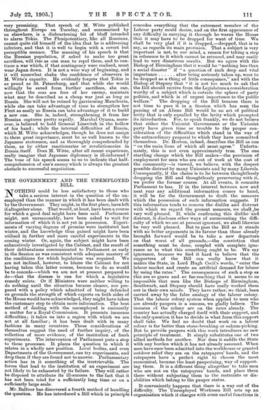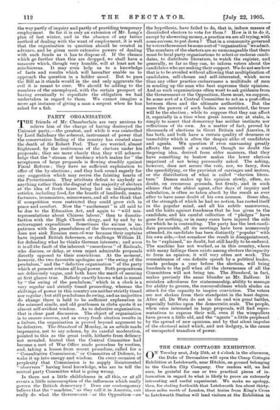THE GOVERNMENT AND THE UNEMPLOYED BILL. N OTHING could be less
satisfactory to those who take a serious interest in the question of the un- employed than the manner in which it has been dealt with by the Government. They might, in the first place, have left it altogether alone. That would, at least, have been a course for which a good deal might have been said. Parliament might, not unreasonably, have been asked to wait for information of which it is not yet in possession. Experi- ments of varying degrees of promise were instituted last winter, and the knowledge thus gained might have been utilised in further and more careful experiments in the coming winter. Or, again, the subject might have been exhaustively investigated by the Cabinet, and the result of their deliberations communicated to Parliament as early in the Session as was consistent with adequate mastery of the conditions for which legislation was required. We are not inclined, however, to blame the Cabinet for not having taken this latter course, because to do so would be to concede—which we are not at present prepared to do—that the disease is one for which a legislative remedy exists. Or if Ministers were neither willing to do nothing until the situation became clearer, nor pre- pared with a policy which admitted of being defended on grounds the strength of which experts on both sides of the House would have acknowledged, they might have taken the customary step to obtain more information. The best method of dealing with the unemployed is eminently a matter for a Royal Commission. It presents immense difficulties ; it takes us into a region with which we are not at all familiar ; it has been dealt with in many fashions in many countries. These considerations of themselves suggest the need. of further inquiry, of the collection of more evidence, of the institution of fresh experiments. The intervention of Parliament puts a stop to these processes. It places the question to which it relates in a wholly new position. Local bodies, and even Departments of the Government, can try experiments, and drop them if they are found not to answer. Parliamentary action has in it something of the irretrievable. The forces that lead to the institution of an experiment are not likely to be exhausted by its failure. They will rather be disposed to attribute its ill-success to the fact that it has not been tried for a sufficiently long time or on a sufficiently large scale.
Mr. Balfour has discovered a fourth method of handling the question. He has introduced a Bill which in principle concedes everything that the extremest member of the Labour party could desire, and on the first appearance of any difficulty in carrying it through he warns the House that it may have to be dropped for want of time. We shall be very glad if it is dropped,—dropped, that is to say, as regards its main provision. That a subject is very important is not, to our mind, a reason for taking a step in reference to it which cannot be retraced, and may easily lead to very disastrous results. But we agree with the Bishop of Birmingham that it would be "nothing less than a social disaster " if " a question of such deep and vital importance after being seriously taken up, were to be dropped as a thing of little consequence," and with the Bishop of Stepney that " it is not too much to ask that the Bill should receive from the Legislature a consideration worthy of a subject which is outside the sphere of party politics, and which is of urgent importance to the public welfare." The dropping of the Bill because there is not time to pass it in a Session which has seen the passing of an Aliens Bill would be an act of political levity that is only equalled by the levity which prompted its introduction. For, to speak frankly, we do not believe that either the Unionist Government or the Unionist party have given time or trouble to the proper con- sideration of the difficulties which stand in the way of the extraordinary proposal to which they have committed themselves. Dr. Horton, indeed, describes the Bill as one " on the main lines of which all must agree." Unfortu- nately, this is not even approximately true. The one startling change which the Bill makes—the provision of employment for men who are out of work at the cost of the community—is viewed, we believe, with the deepest possible distrust by many Unionists and by many Liberals. Consequently, if the choice is to lie between thoughtlessly dropping the Bill and thoughtlessly persevering with it, we prefer the former course. At all events, it commits Parliament to less. If in the interval between now and next year any additional information comes to hand, it will be for the Government to draft the measure which the possession of such information suggests. If this information tends to remove the dislike and distrust with which we regard the present measure, we shall abe very well pleased. If, while confirming this dislike 'and distrust, it discloses other ways of surmounting the diffi- culty of which we are at present ignorant, we shall likewise be very well pleased. But to pass the Bill as it stands with no better arguments in its favour than those already brought forward would be to take a new departure on that worst of all grounds,—the conviction that something must be done, coupled with complete igno- rance as to what this something ought to be. We say ignorance, because we find it hard. to believe that the supporters of the Bill can really know that it makes the State, in Lord Hugh Cecil's words, " enter the labour market and create an artificial demand for labour by using the rates." The consequences of such a step as this are so grave and so far-reaching that it seems to us impossible that men like the Bishops of Birmingham, Southwark, and Stepney should have really worked them out in their own minds. They have rather, we think, been carried. away by the false analogy of the labour colony. That the labour colony system when applied to men who are already paupers is a success, we gladly believe. The inmates of the colony are on the rates already. The country has actually charged itself with their support, and the only question it has to decide is what form this support shall take. We feel no doubt that work on a labour colony is far better than stone-breaking or oakum-picking. But to provide paupers with this work introduces no new principle of treatment. It simply substitutes one of two allied methods for another. Nor does it saddle the State with any burden which it has not already assumed. When men have once been admitted into the workhouse or granted outdoor relief they are on the ratepayers' bands, and the ratepayers have a perfect right to choose the most economical, because the least pauperising, way of support- ing them. It is a different thing altogether to take men who are not on the ratepayers' bands, and place them there without subjecting them to the restraints or dis- abilities which belong to the pauper status.
It conveniently happens that there is a way out of the difficulty. The Unemployed. Workmen Bill sets up an organisation which it charges with some useful functions in the way partly of inquiry and partly of providing temporary employment. So far it is only an extension of Mr. Long's plan of last winter, and in the absence of any better method of dealing with the want of employment, it is well that the organisation in question should be created in advance, and be given more extensive powers of dealing with such funds as it has to dispose of. If the clauses which go further than this are dropped, we shall have a measure which, though very humble, will at least not be mischievous. It may even help us to a knowledge of facts and results which will hereafter enable us to approach the question in a bolder mood. But to pass the Bill as it stands would in the end only aggravate the evil it is meant to cure. We should be adding to the numbers of the unemployed, with the certain prospect of having eventually to repudiate the obligation we had undertaken in regard to them. We cannot imagine a more apt instance of giving a man a serpent when he has asked for a fish.



































 Previous page
Previous page